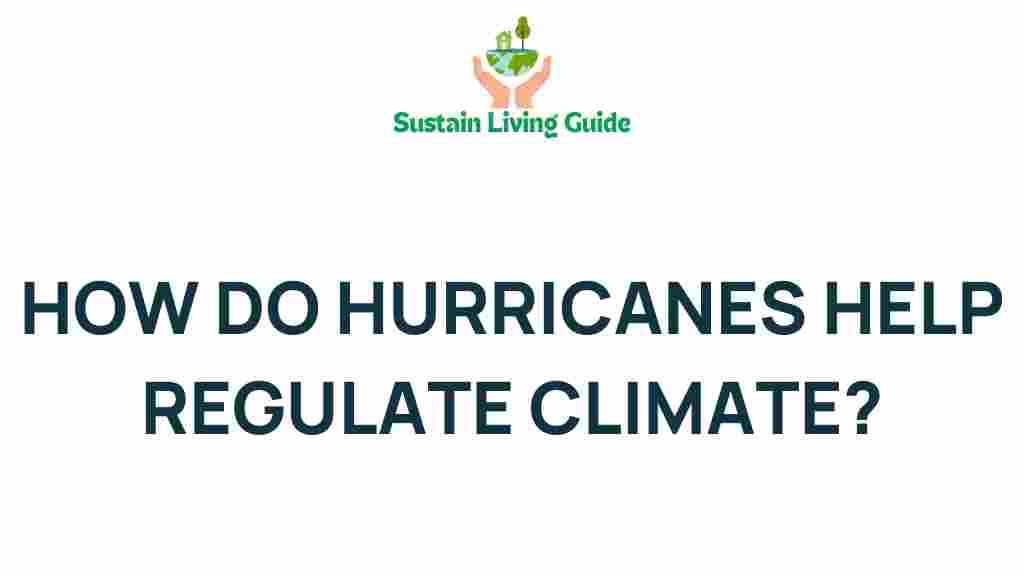Understanding Hurricanes: Nature’s Balancers
Hurricanes are powerful natural phenomena that can wreak havoc on communities, but their role in the Earth’s climate system is often overlooked. While they can cause destruction, hurricanes also play a crucial role in regulating the climate by redistributing heat and moisture around the planet. This article will delve into the intricacies of hurricanes, exploring their formation, impact on climate, and the balance they maintain in nature.
The Formation of Hurricanes
Hurricanes form over warm ocean waters, typically when temperatures exceed 26.5°C (about 80°F). The process involves several key ingredients:
- Warm Water: The ocean’s heat fuels the storm, providing the energy needed for hurricane development.
- Humidity: A moist atmosphere allows for the condensation of water vapor, which releases heat and further powers the storm.
- Wind Patterns: Specific wind conditions, such as the Coriolis effect, help to initiate the rotation of the storm.
- Low-Pressure System: A pre-existing weather disturbance can help kickstart the hurricane formation process.
Once these conditions align, a tropical depression can develop into a tropical storm and eventually a hurricane, characterized by sustained winds of 74 mph or greater.
The Life Cycle of a Hurricane
The life cycle of hurricanes can be broken down into several stages:
- Tropical Disturbance: A cluster of thunderstorms that may develop into a tropical depression.
- Tropical Depression: A system with organized convection and a defined circulation.
- Tropical Storm: When sustained winds reach 39 mph, it is given a name and classified as a tropical storm.
- Hurricane: At 74 mph, it is classified as a hurricane, with a well-defined eye and organized wind patterns.
- Post-Tropical Cyclone: After making landfall or weakening, the storm dissipates and loses its tropical characteristics.
The Climate Role of Hurricanes
Hurricanes are often perceived solely as destructive forces, but they serve several essential functions in the Earth’s climate system:
Heat Redistribution
One of the primary roles of hurricanes is heat redistribution. The oceans store vast amounts of solar energy, and hurricanes act as a mechanism to transfer this heat from the tropics to higher latitudes. This process helps to regulate global temperatures and maintain climate balance.
Moisture Transport
Hurricanes transport moisture from the ocean into the atmosphere. This moisture can lead to rainfall in regions that need it, replenishing water supplies and supporting ecosystems. In many cases, hurricanes can alleviate drought conditions by providing much-needed precipitation.
Influencing Weather Patterns
Hurricanes play a significant role in shaping weather patterns and influencing climatic conditions. Their formation and movement can affect the jet stream, altering weather across vast regions. For example, the remnants of a hurricane can lead to increased rainfall and cooler temperatures far from the storm’s origin.
The Impact of Hurricanes on Ecosystems
While hurricanes can cause immediate devastation, they can also have long-term benefits for ecosystems:
- Coastal Restoration: The strong winds and waves can reshape coastlines, creating new habitats for marine life.
- Forest Regeneration: Hurricanes can clear dead trees and promote new growth in forests.
- Wetland Rejuvenation: Storm surges can replenish wetlands, supporting biodiversity.
Challenges and Concerns
Despite their natural role, hurricanes pose significant challenges:
Climate Change and Increased Hurricane Intensity
As global temperatures rise due to climate change, the frequency and intensity of hurricanes are also expected to increase. Warmer ocean waters provide more energy for storms, potentially leading to more severe hurricanes with higher wind speeds and increased rainfall. Studies suggest that a warmer climate may lead to:
- More Intense Hurricanes: An increase in the number of Category 4 and 5 hurricanes.
- Increased Rainfall: A higher likelihood of extreme precipitation events associated with hurricanes.
- Rising Sea Levels: Enhanced storm surges and flooding in coastal areas.
Impact on Human Populations
Hurricanes have a profound impact on human populations, particularly in vulnerable coastal regions. The consequences of hurricanes can be devastating:
- Property Damage: High winds and flooding can destroy homes and infrastructure.
- Economic Disruption: The aftermath of hurricanes often leads to significant economic losses, affecting local and national economies.
- Displacement: Communities may be forced to evacuate, leading to long-term displacement and social challenges.
Preparation and Response to Hurricanes
To mitigate the impact of hurricanes, effective preparation and response strategies are essential. Here are some important steps:
Step-by-Step Hurricane Preparedness
- Stay Informed: Monitor weather forecasts and advisories from the National Hurricane Center or local authorities.
- Create an Emergency Plan: Develop a plan for your family that includes evacuation routes, communication methods, and emergency supplies.
- Prepare an Emergency Kit: Stock your kit with essentials such as food, water, medications, and first aid supplies.
- Secure Your Property: Reinforce windows, doors, and roofs to minimize damage from strong winds.
- Evacuate When Necessary: If advised to evacuate, do so promptly to ensure your safety.
Troubleshooting Common Issues
During and after a hurricane, various challenges can arise. Here are some troubleshooting tips:
- Power Outages: Keep flashlights, batteries, and a portable charger handy. Consider investing in a generator.
- Flooding: Move to higher ground and avoid walking through floodwaters. Follow local guidance on staying safe.
- Property Damage: Document damage for insurance purposes and secure your home to prevent further issues.
Conclusion
Hurricanes are powerful forces of nature that, despite their destructive capabilities, play a vital role in maintaining the balance of our climate. By redistributing heat and moisture and influencing weather patterns, hurricanes contribute to the Earth’s climate system. However, as climate change alters their behavior, it is crucial to understand their impact and prepare effectively. By recognizing the dual nature of hurricanes as both destructive and beneficial, we can better appreciate their role in our planet’s complex climate system.
For more information about hurricanes and their effects, visit the National Hurricane Center. To learn about emergency preparedness, check out local resources and guidance from your local authorities. Understanding hurricanes helps us navigate the challenges they present while appreciating their integral role in nature.
This article is in the category Climate and created by SustainLivingGuide Team
